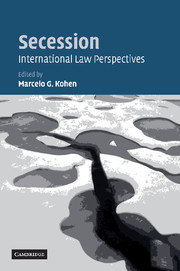Book contents
- Frontmatter
- Contents
- List of contributors
- Preface
- Table of cases
- Table of international instruments
- List of abbreviations
- Introduction
- PART I The Foundations of International Law and Their Impact on Secession
- 1 Secession and self-determination
- 2 Secession, terrorism and the right of self-determination
- 3 Secession and external intervention
- 4 The role of recognition in the law and practice of secession
- 5 The State as a ‘primary fact’: some thoughts on the principle of effectiveness
- 6 A normative ‘due process’ in the creation of States through secession
- 7 Secession and the law of State succession
- 8 Are there gaps in the international law of secession?
- PART II International and Domestic Practice
- 15 Conclusions
- Select bibliography
- Index
4 - The role of recognition in the law and practice of secession
Published online by Cambridge University Press: 23 July 2009
- Frontmatter
- Contents
- List of contributors
- Preface
- Table of cases
- Table of international instruments
- List of abbreviations
- Introduction
- PART I The Foundations of International Law and Their Impact on Secession
- 1 Secession and self-determination
- 2 Secession, terrorism and the right of self-determination
- 3 Secession and external intervention
- 4 The role of recognition in the law and practice of secession
- 5 The State as a ‘primary fact’: some thoughts on the principle of effectiveness
- 6 A normative ‘due process’ in the creation of States through secession
- 7 Secession and the law of State succession
- 8 Are there gaps in the international law of secession?
- PART II International and Domestic Practice
- 15 Conclusions
- Select bibliography
- Index
Summary
Introduction
Recognition and secession are closely associated. Recognition has provided the imprimatur of statehood to seceding entities for over two hundred years. Early secessions were, however, generally portrayed as assertions of independence from colonial empires or unions rather than as secessions. As international law until recent times did not exalt respect for existing boundaries into a well-nigh absolute rule, secessions were anticipated, if not approved, as a natural consequence of decolonisation and the restructuring of States to correspond to historical realities and ethnic needs. Recognition served as the instrument for the validation of claims to statehood on the part of new entities by existing member States of the community of nations. In exercising their discretion to grant or withhold recognition, States were concerned with the requirements of effective government, independence, absence of control by another State and the ability on the part of the claimant State to conduct foreign affairs with existing States, and not with the question whether the emergence of a new State violated the territorial integrity of the State from which it sought to secede. The main prohibition on recognition was to be found in the rule against premature recognition. This probably explains why neither of the leading English-language treatises on recognition – Hersch Lauterpacht's Recognition in International Law (1947) and Ti-Chian Chen's The International Law of Recognition (1951) – treats secession as a topic worthy of separate attention in the context of recognition.
The position has changed radically since the end of decolonisation.
- Type
- Chapter
- Information
- SecessionInternational Law Perspectives, pp. 94 - 137Publisher: Cambridge University PressPrint publication year: 2006
- 29
- Cited by



